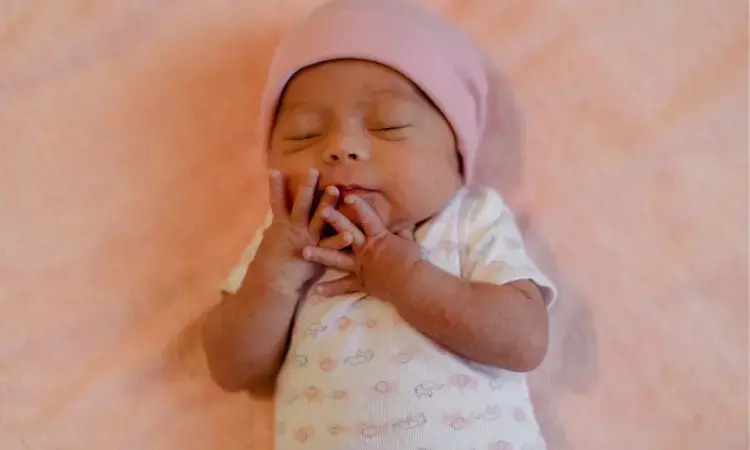- Home
- Medical news & Guidelines
- Anesthesiology
- Cardiology and CTVS
- Critical Care
- Dentistry
- Dermatology
- Diabetes and Endocrinology
- ENT
- Gastroenterology
- Medicine
- Nephrology
- Neurology
- Obstretics-Gynaecology
- Oncology
- Ophthalmology
- Orthopaedics
- Pediatrics-Neonatology
- Psychiatry
- Pulmonology
- Radiology
- Surgery
- Urology
- Laboratory Medicine
- Diet
- Nursing
- Paramedical
- Physiotherapy
- Health news
- Fact Check
- Bone Health Fact Check
- Brain Health Fact Check
- Cancer Related Fact Check
- Child Care Fact Check
- Dental and oral health fact check
- Diabetes and metabolic health fact check
- Diet and Nutrition Fact Check
- Eye and ENT Care Fact Check
- Fitness fact check
- Gut health fact check
- Heart health fact check
- Kidney health fact check
- Medical education fact check
- Men's health fact check
- Respiratory fact check
- Skin and hair care fact check
- Vaccine and Immunization fact check
- Women's health fact check
- AYUSH
- State News
- Andaman and Nicobar Islands
- Andhra Pradesh
- Arunachal Pradesh
- Assam
- Bihar
- Chandigarh
- Chattisgarh
- Dadra and Nagar Haveli
- Daman and Diu
- Delhi
- Goa
- Gujarat
- Haryana
- Himachal Pradesh
- Jammu & Kashmir
- Jharkhand
- Karnataka
- Kerala
- Ladakh
- Lakshadweep
- Madhya Pradesh
- Maharashtra
- Manipur
- Meghalaya
- Mizoram
- Nagaland
- Odisha
- Puducherry
- Punjab
- Rajasthan
- Sikkim
- Tamil Nadu
- Telangana
- Tripura
- Uttar Pradesh
- Uttrakhand
- West Bengal
- Medical Education
- Industry
Necrotizing enterocolitis common in third week after birth among very preterm, low birthweight infants

Necrotising enterocolitis (NEC) is the most common gastrointestinal medical/surgical emergency occurring in neonates. Focal intestinal perforation (FIP) is an acquired neonatal intestinal disease, defined as a single or occasionally multiple perforations, typically in the terminal ileum and histologically distinct from NEC.
The Original Research, “Age of onset of necrotizing enterocolitis (NEC) and focal intestinal perforation (FIP) in very preterm and low birthweight infants: a systematic review”, mentioned the onset of necrotizing enterocolitis at the third week for very preterm, low birthweight infants.
The main objective of the present study was to review the Age of onset of Necrotising enterocolitis (NEC) and focal intestinal perforation (FIP) in very preterm (≤32 weeks) and very low birth weight (VLBW, ≤1500 g) infants.
In this study, the databases used were MEDLINE/ PubMed, Embase, CINAHL and Cochrane Central Register of Controlled Trials.
Researchers extracted the Age of onset as a day of life (DOL) and corrected gestational Age (CGA) alongside study information.
The key results of this study are:
· Total of 747 studies were screened, and 188 were eligible
· After eliminating duplicate and ineligible studies,10 RCTs and 14 observational studies were left.
· This contributed to 51 NEC cohorts; 49 reported onset DOL and 14 CGA.
· 2984 cases of Necrotising enterocolitis (NEC) had average DOL onset of 16.7 and CGA onset of 30.1 weeks.
· There was no impact of Gestation on DOL onset.
· Demographic features were not known to impact Necrotising enterocolitis (NEC) onset.
Concluding further, they said the Average onset of Necrotising enterocolitis (NEC) in exclusively very preterm/very low birth weight infants is in the third week of life and, unlike in cohorts, including more mature or heavier infants, is not impacted by birth gestation.
Given its importance to neonatal medicine, standardised reporting for all studies where NEC is a primary or secondary outcome would improve mechanistic and trial understanding.
Further reading:
BDS, MDS in Periodontics and Implantology
Dr. Aditi Yadav is a BDS, MDS in Periodontics and Implantology. She has a clinical experience of 5 years as a laser dental surgeon. She also has a Diploma in clinical research and pharmacovigilance and is a Certified data scientist. She is currently working as a content developer in e-health services. Dr. Yadav has a keen interest in Medical Journalism and is actively involved in Medical Research writing.
Dr Kamal Kant Kohli-MBBS, DTCD- a chest specialist with more than 30 years of practice and a flair for writing clinical articles, Dr Kamal Kant Kohli joined Medical Dialogues as a Chief Editor of Medical News. Besides writing articles, as an editor, he proofreads and verifies all the medical content published on Medical Dialogues including those coming from journals, studies,medical conferences,guidelines etc. Email: drkohli@medicaldialogues.in. Contact no. 011-43720751


